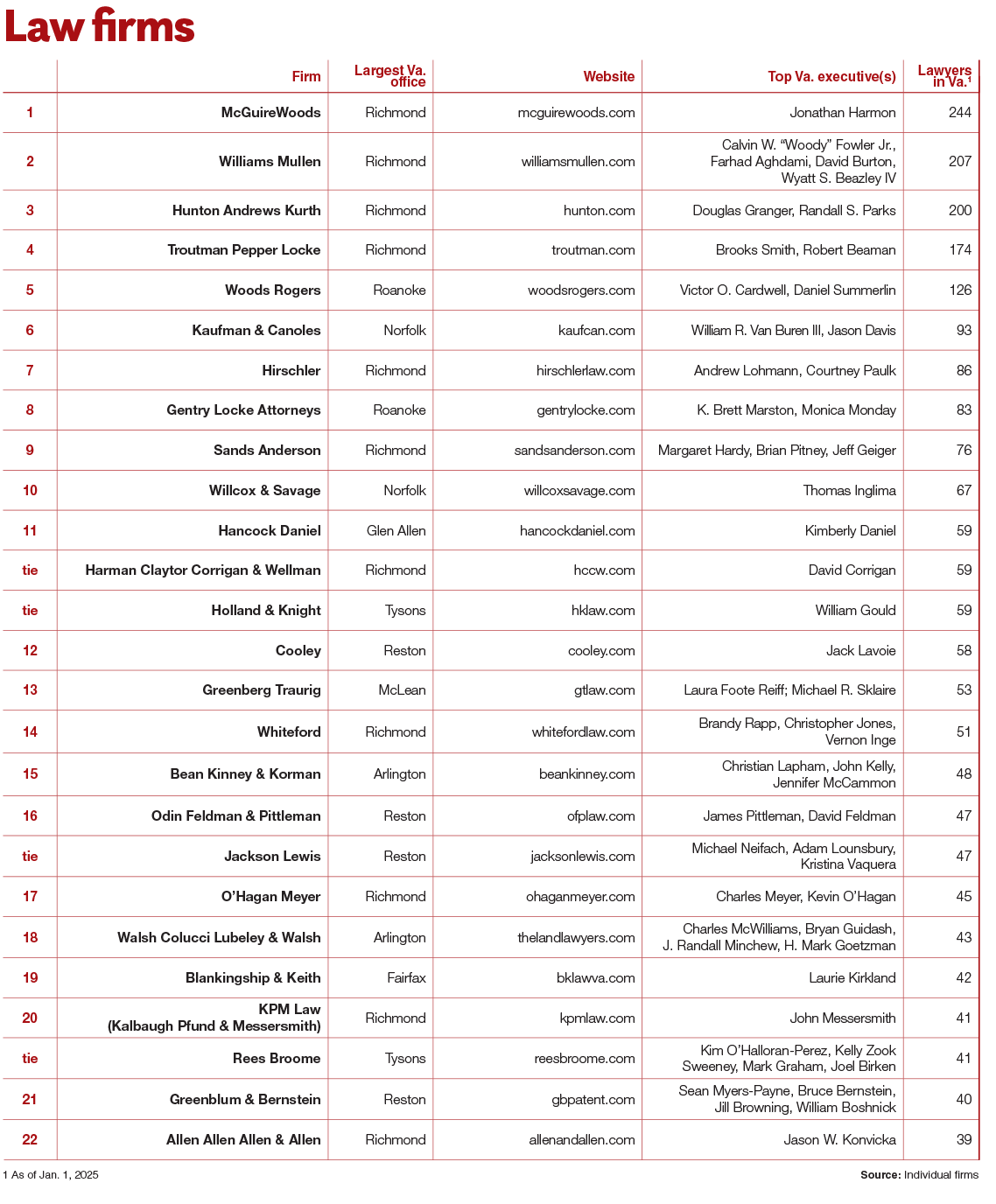Law firms advise businesses on Trump 2.0 policies
Regulatory changes, immigration and DEI among hot topics

With the Trump administration ushering in wide-ranging federal policy changes, it’s a good time for businesses to “conduct a wellness check,” says attorney Kristin Johnson with Woods Rogers. Photo courtesy Woods Rogers

With the Trump administration ushering in wide-ranging federal policy changes, it’s a good time for businesses to “conduct a wellness check,” says attorney Kristin Johnson with Woods Rogers. Photo courtesy Woods Rogers
Law firms advise businesses on Trump 2.0 policies
Regulatory changes, immigration and DEI among hot topics
Summary
It’s been a busy start to the year for many Virginia law firms as clients are trying to make sense of the many fast-moving and wide-ranging changes ushered in by President Donald Trump’s return to the White House.
“Really from the start of the transfer of the administration, we got calls from clients who were just trying to navigate this evolving and ever-changing landscape, and the questions have continued to pour in,” says Kristin Johnson, an attorney in Roanoke with Woods Rogers‘ government and special investigations practice.
Likewise, phones at McGuireWoods started “flying off the hook” in January after Trump took office, says John Moran, a partner and member of the firm’s government investigations and white collar litigation department in Washington, D.C. “The number of issues that clients have sought help in navigating is almost as varied as the clients themselves.”
Clients have had plenty to seek counsel about. While it’s common, lawyers say, to see an uptick in queries after a new presidential administration takes over, what’s different this time around is the fast and furious pace of activity. In his first few months in office, Trump signed nearly half the number of executive orders he did in the entirety of his prior four-year term and surpassed the annual totals of executive orders for every president since Harry S. Truman, according to data from the Federal Register.
Trump’s 2025 executive orders have prompted a lot of inquiries, particularly as clients try to make sense of any legal implications for their businesses from the various policy changes. But such conversations are also an opportunity to discuss business strategies amid a changing federal regulatory environment.

Immigration, DEI in focus
Very quickly, a theme emerged among the earliest incoming calls from business clients: They wanted to know what, if anything, the Trump administration’s stance on immigration and diversity, equity and inclusion (DEI) policies would mean for their workplaces.
On his first day back in office, Trump signed executive orders focused on stronger enforcement of immigration laws and ending government DEI programs. In turn, clients from a wide swath of industries have had “a lot of questions” about how these executive orders could affect their own employment policies, says Greg Habeeb, a chair of Gentry Locke Attorneys’ government and regulatory affairs practice group and president of the firm’s public affairs consulting business.
“Clients always want to be proactive in identifying shifts in the market,” Habeeb says.
At McGuireWoods, DEI has been a recurring theme of inquiries across the three major industries the firm serves — energy, health care and financial services — so its lawyers have helped clients assess their existing policies, Moran says. But it’s not entirely clear what the government’s additional scrutiny on DEI policies means, he adds.
Some clients are unsure whether they should pare back or keep in place DEI initiatives, for example, Moran says. “It can make companies feel like they’re in a bind.”
Further complicating matters is that while presidential executive orders aren’t laws, they do have the force and effect of laws. Legal questions have already been raised about the constitutionality of some of Trump’s executive orders, which can be confusing for clients trying to navigate uncertainty.
Some of the Trump administration’s policy changes won’t be viewed as settled by many people in the legal industry unless and until the U.S. Supreme Court weighs in, Moran says.
As a result, there’s an “open question” about what legal effect Trump’s executive orders will ultimately have until they’re tested in the legal system, Johnson says. “The guidance and advice may change over time as things evolve.”
Habeeb, Moran and Johnson say that questions about DEI have been common, particularly from clients in industries that receive federal funding, including health care, higher education and government contracting. Immigration-related queries have also been common because clients want to be sure they’re in compliance with the law, can obtain proper documentation from employees and know what to do if personnel from the U.S.
Immigration and Customs Enforcement (ICE) were to come to their businesses, she adds.
And given everything going on, questions from clients are rarely a “one-and-done call,” Johnson says. “The environment is very fluid, the guidance we’re giving is fluid, and our firm is really staying on top of all of this to make sure our clients are properly advised.”
Navigating regulatory changes
Making sure that clients are properly advised means helping clients through problems that don’t necessarily have legal solutions. In his nearly 25-year career practicing law, Habeeb has grown accustomed to clients asking questions any time there’s a leadership change in Washington, D.C., but that doesn’t necessarily mean businesses must make changes in response.
Instead, Habeeb urges clients to be nimble because it’s important not to rely too much on any particular policy or regulatory environment that’s bound to change if a new administration takes power. “Any business or any industry where change is automatically bad for business is not in a good position for long-term success.”
Similarly, Moran says, some of his firm’s clients in the energy industry are more focused on the uncertainties around regulatory changes than placing additional scrutiny on their employment policies. “These clients are trying to navigate their way through a deregulatory environment without mis-stepping, or they’re wanting to come up with a thoughtful approach.”
Offering strategic advice that goes beyond legal counsel isn’t new, but these lawyers say it’s more pronounced when clients are trying to make sense of a lot of changes at once. These firms are taking a proactive approach, be it through traditional outreach, mass email blasts or updating their websites with information on key developments.
In many ways, it’s business as usual for Habeeb, though a new presidential administration means there’s more to do to keep clients up to date, adding, “I try to look around corners for clients and prepare them.” In addition, the best solutions to problems that clients are facing aren’t necessarily legal in nature, and that’s true now. “I don’t have a preconceived set of solutions.”
Similarly, Moran says the advice he and his colleagues are offering their clients falls into three buckets for offering advice, only one of which is strictly legal. They may talk clients through how to think about the current state of the law and what’s changing, they may do some combination of “reading the law and the policy tea leaves” to advise clients on the administration’s broader goals, and finally, they offer guidance on the personalities of administration members and how to best work with them.
“It’s all the more important that clients are not only getting good advice and answers to discrete legal questions, but sound and wise counsel about how to navigate broader challenges they face,” Moran says.
Such an approach is more holistic in nature and requires clients to also ensure they have a good handle on everything happening in their businesses, Johnson says. She recommends that businesses do a deep dive into their third-party relationships and assess whether compliance departments have the most effective procedures in place.
“It’s a really good time for businesses to conduct a wellness check,” Johnson says.





















